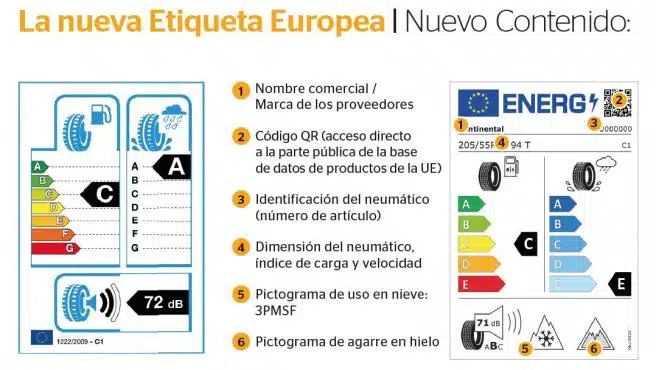Neumáticos Eficientes: Save Up to 90 Euros Annually on Fuel

The choice of efficient tires has become an essential aspect for those looking to optimize their fuel consumption. These tires, designed to reduce rolling resistance, not only improve the grip and safety of the vehicle but can also generate significant savings of up to 90 euros annually in fuel expenses. This decision not only positively impacts one’s wallet but also contributes to a more sustainable environment by decreasing CO2 emissions.
The choice of efficient tires is fundamental for any driver wishing to reduce their fuel expenses. These tires, which stand out for their low rolling resistance, not only improve the grip and safety of the vehicle but can also result in significant economic savings of up to 90 euros annually. This article explores how efficient tires can positively impact your economy and the environment.
Importance of Tires in Fuel Consumption
Tires are the only point of contact between the vehicle and the road, making their choice crucial for the overall performance of the car. It is estimated that tires are responsible for approximately 21% of a vehicle’s fuel consumption. Therefore, proper selection and care of these can lead to greater energy efficiency as well as prolonged lifespan.
One of the most relevant aspects to consider is rolling resistance, which is defined as the energy lost when the tire rolls. With lower resistance, less energy is used, resulting in more efficient fuel consumption. This aspect not only affects economic savings but also contributes to a reduction of CO2 emissions.
How to Choose Efficient Tires
The tire label provides key information about their energy performance and environmental impact. Tires are classified on a scale from A to E, where A indicates the highest energy efficiency. By choosing tires with an A rating, it is possible to save up to half a liter of fuel per 100 kilometers. Additionally, it is essential to consider other factors such as grip in wet conditions and the level of noise they produce.
Economic Savings with Efficient Tires
Taking as an example a journey of 621 kilometers between Madrid and Barcelona, a vehicle using tires rated with an A will consume 30 liters of fuel. In comparison, a vehicle equipped with tires rated with an E will consume 32.4 liters, representing a saving of approximately 2.4 liters on a single trip. This translates to economic savings of between 4 and 5 euros per trip, considering the current price of gasoline and diesel.
Considering an average journey of 12,000 kilometers annually, one can estimate a savings of 50 liters of fuel per year, which equates to a reduced cost of between 83 and 90 euros annually, depending on the price of fuel. By the end of their lifespan, which averages 45,000 kilometers, the total savings could reach about 300 euros just by choosing more efficient tires.
Tire Maintenance and Behavior
Beyond the initial choice, the proper maintenance of tires is essential to preserving their efficiency. Maintaining the correct pressure, avoiding overloading the vehicle, and adopting responsible driving habits, such as avoiding sudden accelerations, are crucial for preserving tire performance. A tire that does not maintain its correct pressure can become a greater fuel consumer.
On the other hand, in winter conditions, it is advisable to opt for winter tires or all-weather tires, which not only improve grip on cold roads but can also help avoid the use of chains, thus facilitating travel.
Consequences of Poor Tire Condition
Driving with worn or poorly maintained tires is not only dangerous but also increases fuel consumption. If caught using tires in poor condition, one may face significant fines, thereby increasing the overall operating cost of the vehicle. Therefore, it is vital to regularly check the condition of the tires, ensuring that their tread does not fall below the legal limit of 1.6 mm.
Additionally, checking the condition of the tires every 10 years or after reaching a considerable number of kilometers is a prudent action to avoid penalties and unnecessary expenses in the long run.
Conclusion on Savings and Efficiency
Choosing efficient tires not only provides economic benefits but also contributes to a more sustainable environment. Investing in well-rated tires and maintaining responsible driving practices results in significant fuel savings, favorable for both the wallet and the planet.
Conclusion on Efficient Tires: Save Up to 90 Euros Annually on Fuel
The choice of efficient tires is presented as a fundamental decision for motorists seeking not only to improve road safety but also to optimize their fuel expenses. A tire with low rolling resistance allows for reduced fuel consumption, translating this savings into a significant reduction of annual expenses that can reach up to 90 euros.
It is crucial to understand that tires are not just a comfort element, but play a decisive role in the vehicle’s economy. Their impact not only directly affects the driver’s wallet but also influences the carbon footprint of the car. By selecting tires with a high energy efficiency rating, it is possible to not only decrease fuel consumption but also contribute to the reduction of CO2 emissions.
Furthermore, keeping tires in optimal conditions, including monitoring their pressure and using them correctly, can further maximize fuel performance. The combination of informed choice and proper maintenance allows for results not only in economic terms but also in vehicular safety and sustainability.
On the other hand, using efficient tires generates a positive effect on vehicle behavior on the road, especially in adverse conditions. A quality tire offers improved grip, which can be decisive in rainy or bad weather situations, thus minimizing the risk of accidents.
In summary, investing in efficient tires is a smart strategy that not only provides relief from daily expenses but also promotes responsible and environmentally conscious driving.



